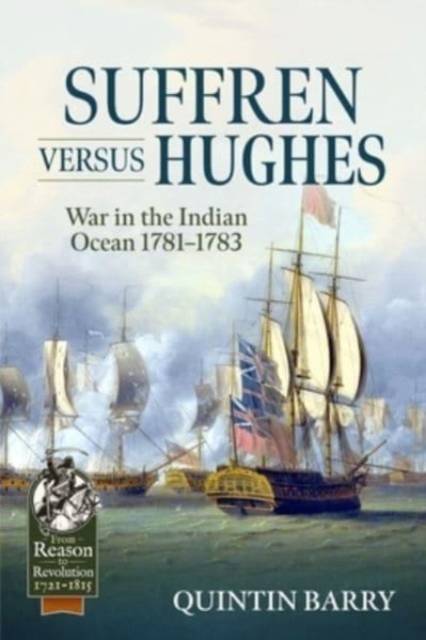
- Retrait gratuit dans votre magasin Club
- 7.000.000 titres dans notre catalogue
- Payer en toute sécurité
- Toujours un magasin près de chez vous
- Retrait gratuit dans votre magasin Club
- 7.000.000 titres dans notre catalogue
- Payer en toute sécurité
- Toujours un magasin près de chez vous
Description
Suffren versus Hughes describes the fascinating but relatively little-known naval campaign between Britain and France for mastery of the Indian Ocean in the closing years of the War of American Independence. It is effectively the third volume of a trilogy recording the history of the Royal Navy during this period, the earlier volumes being Crisis at the Chesapeake (2021) and From Ushant to Gibraltar (2022).
The contest for control of the sea was crucial to the maintenance of Britain's position in India. It was played out against the political, economic and military background created by the impact of the British East India Company upon the complex system of the various dynasties that ruled India, and which themselves competed with each other for advantage.
Britain and France sent out squadrons of ships of the line which were at various times nearly equal in strength. In the course of their hard-fought campaign, these fought five battles, none of which produced the decisive victory which each sought.
This campaign was remarkable not just for the strategic and tactical questions which it raised, but also for the light it shed on the characters and abilities of the respective commanders. Sir Edward Hughes and Pierre-André de Suffren were very different men, who brought to their commands contrasting approaches to the particular problems of naval warfare of the eighteenth century. Hughes was a very typical product of the traditions of the Royal Navy, a patient and careful exponent of all that he had learned from his training and experience. Suffren, on the other hand, was untypical of French admirals of the period; he was bold, aggressive and innovative, and impatient of the stately conventions of sea battles of the period.
Each of them had extremely difficult problems to overcome, in addition to the fact that they were operating many thousands of miles from home, which meant that orders reached them months after they were first issued. Hughes faced considerable difficulties in his relationship with the various presidencies of the East India Company which ruled British India at this time. Suffren, on the other hand, who conducted the campaign for the most part without any effective base, was frequently badly let down by some of his captains, while the performance of his squadron demonstrated that the French navy was far less efficient than the British. For both men, a central problem was obtaining supplies, as well as that of effecting repairs to their ships some of which were extremely badly damaged during the battles which they fought.
The two men had a very considerable respect for each other. However, while the life and career of Suffren has generated a huge literature, principally among French historians, that of Hughes has passed relatively unnoticed. Both men, though, deserved well of their countrymen for what they were able to achieve.
The contest for control of the sea was crucial to the maintenance of Britain's position in India. It was played out against the political, economic and military background created by the impact of the British East India Company upon the complex system of the various dynasties that ruled India, and which themselves competed with each other for advantage.
Britain and France sent out squadrons of ships of the line which were at various times nearly equal in strength. In the course of their hard-fought campaign, these fought five battles, none of which produced the decisive victory which each sought.
This campaign was remarkable not just for the strategic and tactical questions which it raised, but also for the light it shed on the characters and abilities of the respective commanders. Sir Edward Hughes and Pierre-André de Suffren were very different men, who brought to their commands contrasting approaches to the particular problems of naval warfare of the eighteenth century. Hughes was a very typical product of the traditions of the Royal Navy, a patient and careful exponent of all that he had learned from his training and experience. Suffren, on the other hand, was untypical of French admirals of the period; he was bold, aggressive and innovative, and impatient of the stately conventions of sea battles of the period.
Each of them had extremely difficult problems to overcome, in addition to the fact that they were operating many thousands of miles from home, which meant that orders reached them months after they were first issued. Hughes faced considerable difficulties in his relationship with the various presidencies of the East India Company which ruled British India at this time. Suffren, on the other hand, who conducted the campaign for the most part without any effective base, was frequently badly let down by some of his captains, while the performance of his squadron demonstrated that the French navy was far less efficient than the British. For both men, a central problem was obtaining supplies, as well as that of effecting repairs to their ships some of which were extremely badly damaged during the battles which they fought.
The two men had a very considerable respect for each other. However, while the life and career of Suffren has generated a huge literature, principally among French historians, that of Hughes has passed relatively unnoticed. Both men, though, deserved well of their countrymen for what they were able to achieve.
Spécifications
Parties prenantes
- Auteur(s) :
- Editeur:
Contenu
- Nombre de pages :
- 126
- Langue:
- Anglais
- Collection :
Caractéristiques
- EAN:
- 9781804513392
- Date de parution :
- 31-03-24
- Format:
- Livre broché
- Format numérique:
- Trade paperback (VS)
- Dimensions :
- 155 mm x 234 mm
- Poids :
- 500 g







